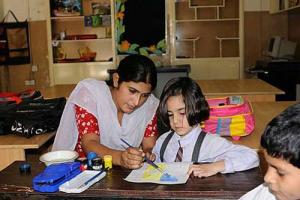Six million new teachers needed to ensure UN goal of universal primary education
The United Nations marked World Teachers’ Day today with a warning that 6.1 million more teachers are needed to meet the internationally agreed Millennium Development Goal (MDG) of attaining universal primary education by 2015.

Two million of these are additional posts, with sub-Saharan Africa alone accounting for more than half. But the shortfall also affects industrialized nations such as the United States, Spain, Ireland, Italy and Sweden, according to data published by the UN Educational, Scientific and Cultural Organization (UNESCO) Institute for Statistics.
The remaining 4.1 million teachers are needed to replace those leaving the profession for a variety of reasons such as retirement, illness or career change.
Of the two million additional posts, sub-Saharan Africa accounts for 1,115,000, the Arab States for 243,000, South and West Asia for 292,000, and North America and Western Europe for 155,000. Central and Eastern Europe, Central and East Asia, Latin American and the Caribbean, on the other hand, together account for only 11 per cent of the global shortage.
The theme of World Teachers’ Day 2011 is ‘Teachers for gender equality,’ reflecting a profession in which women outnumber men in primary schools, accounting for 62 per cent of teachers worldwide. In some countries they account for 90 per cent of primary school teachers. But their working conditions, pay, and status are deteriorating.
“If we want to give equal opportunities to our daughters and sons to realize their full potential and claim their rights, we must devise policies and strategies that attract and motivate capable women and men to teach, while also enabling them to create gender-equal learning environments,” UNESCO Director-General Irina Bokova said.
Her message was co-signed by the heads of the UN Children’s Fund (UNICEF), UN Development Programme (UNDP), UN International Labour Organization (ILO), and Education International, the international federation of education trade unions.
UNESCO events for the Day included testimonies by teaching professionals about “Gender at school: an essential question of education,” an open forum on gender issues in the teaching force), and the launch of a new publication, Women and the Teaching Profession: Exploring the ‘Feminization’ Debate in Selected Commonwealth Countries, featuring case studies on the role of teachers in the expanding the educational systems of countries such as Dominica, India, Lesotho, Samoa and Sri Lanka.
Meanwhile, the UN Relief and Works Agency for Palestine Refugees in the Near East (UNRWA) marked World Teachers’ Day by launching an education reform strategy that aims to improve the quality of learning for students at the 700 schools the agency runs across the region.
The strategy focuses on boosting teacher development, curriculum and student assessment, and technical and vocational training.
UNRWA schools provide an estimated 500,000 Palestinian refugee children with a basic education free of charge.
Source: UN News
- 543 reads
Human Rights
Ringing FOWPAL’s Peace Bell for the World:Nobel Peace Prize Laureates’ Visions and Actions

Protecting the World’s Cultural Diversity for a Sustainable Future

The Peace Bell Resonates at the 27th Eurasian Economic Summit

Declaration of World Day of the Power of Hope Endorsed by People in 158 Nations

Puppet Show I International Friendship Day 2020

